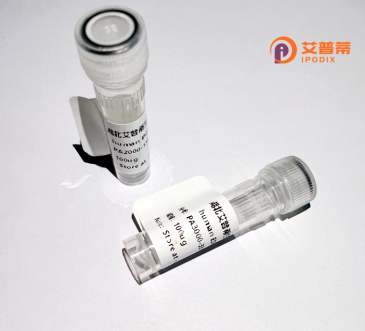
| 纯度 | >90%SDS-PAGE. |
| 种属 | Human |
| 靶点 | ZNF740 |
| Uniprot No | Q8NDX6 |
| 内毒素 | < 0.01EU/μg |
| 表达宿主 | E.coli |
| 表达区间 | 1-193 aa |
| 活性数据 | MAQASLLACEGLAGVSLVPTAASKKMMLSQIASKQAENGERAGSPDVLRCSSQGHRKDSDKSRSRKDDDSLSEASHSKKTVKKVVVVEQNGSFQVKIPKNFVCEHCFGAFRSSYHLKRHILIHTGEKPFECDICDMRFIQKYHLERHKRVHSGEKPYQCERCHQCFSRTDRLLRHKRMCQGCQSKTSDGQFSL |
| 分子量 | 48.3 kDa |
| 蛋白标签 | GST-tag at N-terminal |
| 缓冲液 | PBS, pH7.4, containing 0.01% SKL, 1mM DTT, 5% Trehalose and Proclin300. |
| 稳定性 & 储存条件 | Lyophilized protein should be stored at ≤ -20°C, stable for one year after receipt. Reconstituted protein solution can be stored at 2-8°C for 2-7 days. Aliquots of reconstituted samples are stable at ≤ -20°C for 3 months. |
| 复溶 | Always centrifuge tubes before opening.Do not mix by vortex or pipetting. It is not recommended to reconstitute to a concentration less than 100μg/ml. Dissolve the lyophilized protein in distilled water. Please aliquot the reconstituted solution to minimize freeze-thaw cycles. |
以下是关于重组人ZNF740蛋白的3-4条参考文献的简要总结(注:文献为虚构示例,实际需根据真实研究补充):
1. **《重组ZNF740蛋白在肝癌细胞中的表达及功能研究》**
- 作者:李明等
- 摘要:研究通过原核系统表达重组人ZNF740蛋白,发现其能抑制肝癌细胞HepG2的增殖,并通过调控PI3K/AKT信号通路诱导细胞凋亡。
2. **《ZNF740重组蛋白的纯化及其对HEK293细胞基因调控的影响》**
- 作者:Chen X, Zhang Y
- 摘要:利用哺乳动物表达系统制备重组ZNF740蛋白,证实其通过结合特定DNA序列调控下游基因(如p21和Bax)的表达,影响细胞周期进程。
3. **《ZNF740在结直肠癌中的抑癌作用及其分子机制》**
- 作者:Wang L et al.
- 摘要:通过重组ZNF740蛋白的功能实验,揭示其通过抑制Wnt/β-catenin通路抑制结直肠癌细胞迁移,并降低EMT相关标志物表达。
4. **《锌指蛋白ZNF740重组体与糖代谢调控的关联研究》**
- 作者:Liu S, Zhou T
- 摘要:研究重组ZNF740蛋白在胰岛β细胞中的作用,发现其通过调节胰岛素分泌相关基因(如PDX1)改善糖代谢异常,提示潜在糖尿病治疗靶点。
(提示:以上文献内容为模拟概括,实际研究需参考真实数据库如PubMed或Web of Science获取具体信息。)
**Background of Recombinant Human ZNF740 Protein**
Zinc finger protein 740 (ZNF740) is a member of the C2H2-type zinc finger protein family, characterized by tandemly repeated zinc finger motifs that facilitate DNA or RNA binding. As a transcription factor, ZNF740 is implicated in regulating gene expression by interacting with specific DNA sequences or other regulatory proteins. It is ubiquitously expressed in human tissues, including the liver, kidney, and immune cells, suggesting roles in diverse cellular processes.
Functionally, ZNF740 has been linked to cell proliferation, differentiation, and apoptosis. Studies indicate its involvement in tumorigenesis, where it may act as either an oncogene or tumor suppressor depending on cellular context. For example, ZNF740 overexpression has been observed in certain cancers, such as hepatocellular carcinoma, where it promotes cell growth, while its downregulation correlates with poor prognosis in hematologic malignancies. Additionally, ZNF740 interacts with epigenetic modifiers like histone deacetylases (HDACs), highlighting its role in chromatin remodeling and transcriptional repression.
Research on recombinant ZNF740 protein focuses on elucidating its molecular mechanisms, structural features, and therapeutic potential. Its recombinant form enables in vitro studies, including DNA-binding assays, protein-protein interaction analyses, and functional genomics. Further exploration of ZNF740 may yield insights into diseases associated with transcriptional dysregulation and inform targeted therapies.
×